Gloucestershire 3PL Howard Tenens was established in 1953, and on its website says it “has grown from humble beginnings of making car crates for exporting vehicles to becoming one of the UK’s most successful privately-owned logistics companies”.

It prides itself on being “an industry-leader in complex logistics, never afraid to challenge convention or take on the unimaginable”, while being “being easy to work with, a fact that’s backed up by the many long-term relationships we have with our clients in almost every sector, from retail and FMCG to automotive and packaging”.
The business has grown dramatically in recent years and in the year to September 2022 made a pre-tax profit of £5.7m (£3.6m 2020) on turnover of £106.1m (£84.4m 2020).
Its head office is in Thrupp near Stroud from where it manages an operation spanning seven owned sites at Sharpness, Swindon, Andover, Ashby-de-la-Zouche, Manchester, Chepstow and Boston totalling 4.4m sq ft. They have recently been joined by a new site on the Huntworth Business Park in Bridgwater close to Junction 24 of the M5. With 120,000sq ft of warehousing, 14 dock levellers and extensive yard space, the Bridgwater facility offers ample opportunity for growth in the South West region.
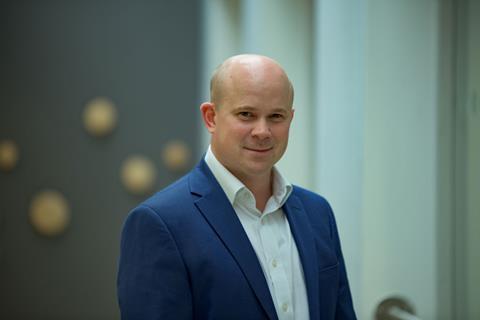
Jamie Hartles, pictured, joined the business in 2007 as commercial manager and was appointed CEO in 2019.
He says Howard Tenens’ philosophy is to work in partnership with customers to build long-term relationships that deliver mutual value. One of the company’s long-standing clients is car manufacturer Honda.
While it ended production at its Swindon plant in 2021 after 36 years and later sold the site to property developer Panattoni, Howard Tenens still provides Honda with an overnight parts distribution service delivering to 155 UK dealers from Honda’s parts warehouse in Swindon. The drivers have the keys and codes to access the dealerships, enabling them to deliver the stock and bring back any returns or empty cages.
“Our relationship with Honda is well over 20 years old now and one where we believe there’s more scope to expand,” says Hartles. “In all of our customer relationships, for us, it’s all about partnership. That’s how we generate that longevity in terms of true mutual value so we’re not just moving that product from A to B.
“We say to them, ‘look, how do we make this better, more efficient, safer?’ We introduce some technology, introduce some sustainability into it and add value rather than just being the cheapest. That’s not what we’re into.”
The Swindon warehouse is supplied from Honda’s large logistics centre in Ghent, Belgium and while Howard Tenens does do some international work, it does not get involved in this particular traffic flow.
“We do have an international offering,” says Hartles. “Typically that is more project work rather than commoditised freight. The international department will help clients which are looking to break into new countries, particularly foodstuffs where regulation is very draconian.
“We will help them with the labelling and the management of that process so it gets there safely and on time.”
Car manufacturers have an obligation to hold their dies and pressings for up to 20 years, and Howard Tenens stores those for Honda at its Boston site in Lincolnshire which provides relatively low-cost warehousing.
Carbon reduction
Howard Tenens has long had a reputation for being a leader on carbon reduction, and has invested heavily in solar power.
“The other thing we look for is resilience,” says Hartles. “We’ve recently invested roughly £12.5m in solar panels across the estate because we own about 4m sq ft of warehousing on a freehold basis. The logistics business makes up roughly a third of that square footage, the rest are third-party tenants. Having that resilience built in to make sure we’ve got a way of generating power, if there are power issues, is really important.”
The firm has set up a subsidiary called HT Power, led by CEO Simon Emms, who is also responsible for the property estate. The business effectively rents the rooftops from the core business and sells the power back to tenants and the logistics business at a discounted rate. In the initial phase the installations do not include batteries to store surplus electricity and in some cases HT Power is struggling to export this surplus back to the grid via the local distribution network operators (DNOs).
“A lot of DNOs we talk to are not interested in exports,” says Hartles. “On the sites that we have managed to get the DNO to buy the energy from, that’s who we’re selling it to. In an ideal world, we would have large batteries on the site, to take the excess energy, store it and use it through the night.
“However, there are sites where we haven’t been able to put the solar on that we would have liked because the DNO isn’t able to take the capacity onto the grid without significant uplift in infrastructure costs, which they expect us to pay.”
Hartles praises the work the UKWA has been doing to raise awareness of these challenges.
“The idea for HT Power is, once we’ve proved it on our own estate, we will then commercialise it and sell it to other people, particularly those who don’t have the capital required to invest in solar. We will make that investment on their behalf and sell them the power back. We’re in the process of doing that with Marston’s Brewery, for example, who is currently not a logistics customer.
“Ideally, we would then get talking about their requirements from a logistics perspective, if we can add value.”
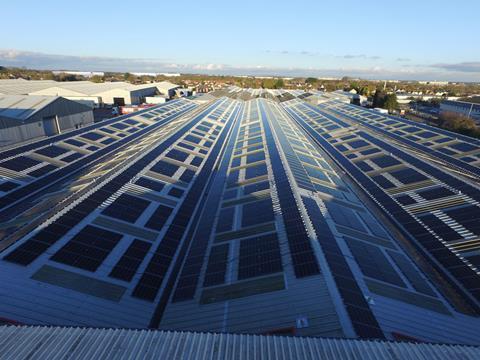
While Howard Tenens owns and operates seven logistics sites, its total footprint is closer to 20 locations.
“The core seven are owned from a freehold perspective, although there are sites such as Chepstow, which is just over 250,000 sq ft, that we don’t operate as a logistics business, but we own as a property business,” explains Hartles. “The logistics business operates out of about 19 sites. For example, for Mars, we have an operation on some of their manufacturing sites, where we’re just clearing the factory and feeding their DCs.
“In another example, Toolstation, in places like Redditch, Daventry and Middleton, they’re running the DC and we’re operating a fleet out of those. We’re also using those sites in some instances as cross-docks for other customers where we’re running national networks.
“Some sites we lease on a third-party basis. Our Sunbury site, which is 55,000sq ft, we lease from a third-party landlord, but we’re running pallet network operations out of there for local postcodes with TPN and UPN.
“For us, it’s about what’s the best solution for the client and what’s going to add the most value for that client. If, ideally, we can make an investment in the site and own it from a freehold perspective, that, for us, is very good.
“As a privately owned business, our objective is to be here in 100 years’ time. It’s not a business where we’re looking to sell it or to expand at a significant rate in order to be able to satisfy shareholders. It’s a business that wants to be profitable and sustainable and enjoyable.
“A big part of working at Howard Tenens is we try and create an environment where people come to work and enjoy it and feel like they make a difference, be that in our employees’ lives, to society or to customers.”
Owning sites freehold has other financial advantages, especially at a time when interest rates are high, volumes are uncertain and low warehouse utilisation can see losses rise rapidly if there is an expensive fixed lease to pay.
“Owning a large asset base very much helps from a balance sheet perspective,” says Hartles. “When you look at the current economic environment, where interest rates are relatively high and borrowing is expensive, gearing becomes a challenge for lots of businesses.
“We are also able to generate internal rents which we can then invest back into the business. A lot of those internal rents are spent by the property business to make sure the estate is repaired and maintained to a very high standard and, when we can, we’ll invest in things like solar panels. That ability to be financially robust but also maintain an element of control is quite important for us.”
While warehousing is clearly a big part the business, Howard Tenens remains a mainly wheels rather than sheds operation.
All about the truck
“Roughly 75% of our business is transport and the remaining 25% is made up of some sort of warehousing solution,” says Hartles. “Clearly, our number one objective is to try and keep our own estate as full as possible. That is no different to anyone else because a half-empty warehouse is very bad for business, regardless of whether you own them or not.
“If we are asked to just do the transport or if we’re asked to do just the warehousing or asked to do both, we’re very happy, as long as we’re going to add value.
“What we tend to find with our relationships is we start by doing a really difficult piece that no one else really wants to do. We’ll do that very well, and we’ll solve that problem. Typically, it’s because we’ve got exceptional people, but that’s also underpinned by our technology.
“Then the client will say ‘can you do this bit as well?’ and it just grows from there. We’ve got lots of relationships that are 15 to 20 years plus where it started off as an acorn and grew into an oak tree. We’ve continued to not just deliver great service, but actually the unit price has come down over time as they have injected scale.”
Equally, Howard Tenens is not afraid to part company with clients who do not want to build lasting relationships and treat logistics as a price-based commodity service.
“We’re quite particular about that because what we don’t want is unhealthy relationships that use what is a finite resource in terms of our management time when we could be doing other things that are more enjoyable,” says Hartles. “That’s something we focus on quite a lot as a senior team in terms of ‘is that relationship really delivering two-way value?’”
Howard Tenens covers the regular core volumes with its inhouse fleet of 220 trucks, using subcontractors to handle the peaks and troughs. The same applies to warehouse staffing, though it is looking to reduce its reliance on agency labour by investing automation where possible. It is installing collaborative mobile robots (cobots) from 6 River Solutions to reduce “peakiness” in labour requirements on some contracts.
“That’s part of the ethos of risk sharing between us and our clients, and putting together solutions which are smart and reflect that need for flexibility and agility,” says Hartles. “That is where having a freehold estate does add value in the warehouse space.”
While the concept of open book contracts now seems a little old school, this is something Howard Tenens still does with some clients – but Hartles prefers to term this type of relationship “gainshare”.
“Gainshare for us is a massive opportunity to pull levers that aren’t available to us by saying to the client for example ‘you could go and speak to your customers about accepting night deliveries and then we could double-shift that fleet’,” he says. “If we share the saving 50-50 in the first year, we’ve covered off the revenue we have foregone by being proactive.
“That’s something that works really well with our clients. It just makes sure that you’re constantly challenging yourselves to be lean, like in a transactional relationship, but you’re saying to the customer ‘if we were you, this is what we’d be doing because you’ve got access to these other savings’.”
This approach sometimes means the company will not always be the lowest bidder on a new tender, but Hartles says winning work purely on price is not the company philosophy.
“That’s absolutely fine by us,” he says. “They’re not the client for us in that case. We’re quite rigorous in making sure that if all someone’s looking for is price, we’re not the right business to work with. We’re very respectful and clear on that, because for us, truly, it’s about adding value.
“It’s not about growing the top line. We have grown relatively significantly because I think we are a good business to work with for the right partner. Our solutions are very lean and they offer very good value for money. Whenever we’re marketplace tested, we tend to do very well unless someone’s decided to put in silly pricing.
“We are providing a great service, and I mean service in that broader logistics sense, and we tend to find that when customers come and work with us, they stay. Therefore, if we decide we really want to work with someone, we will make that very clear, we will put forward a very compelling pitch, and we tend to secure that business.
“Over time, we just increase in size on that basis. We don’t tend to lose a lot, and we win one or two good contracts a year.”
Decarbonisng the truck fleet
Howard Tenens has a plan to be carbon neutral by 2045, five years ahead of the UK’s target date for net zero of 2050.
It currently runs 220 trucks from 7.5 to 44 tonnes GVW, mainly Scania tractor units, after moving away from Mercedes-Benz a few years ago.
“Scania are our chosen provider,” says Hartles. “Although they are a bit more expensive from a capital investment perspective, we found the running costs are lower, MPG is better and repairs and maintenance is better. We tend to look at vehicles over a whole life cost basis so, for us, they have been a very good partner.”
Back in 2009 the company was among the pioneers of diesel-biomethane hybrid trucks. Partly funded by the ‘Low carbon truck demonstration trial’, 20 Euro-5 Mercedes-Benz tractor units were converted to run on a blend of diesel and biomethane, and a CNG refuelling station installed at its Andover depot. The experiment however failed to deliver the expected environmental benefits.
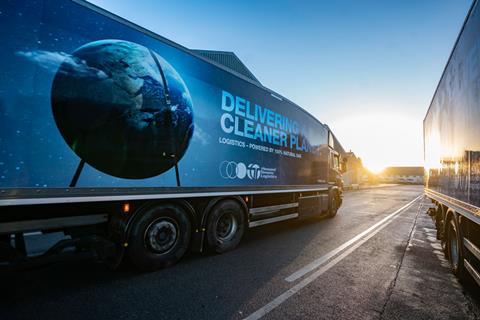
“It was a commercially painful experience,” says Hartles ruefully. “But we’re a private-owned business and the family that owns the business believes in leaving the world better than how they found it.
“Therefore, we invest an awful lot of the profits that we make back into looking for technology which is going to have a positive effect on the environment, and ideally be commercially viable, although we are willing to do things which are not always commercially viable.”
Howard Tenens is now running four Scania gas-powered rigids in Daventry on its contract with Toolstation and recently trialled an Iveco 44-tonne CNG tractor unit.
At the height of its dual-fuel phase, it had three gas refuelling stations, at South Ockendon near London, Boston in Lincolnshire and a larger grid-connected facility at Swindon.
“One of the challenges we have is the cost of gas and making it commercially viable is very difficult,” says Hartles. “We used to run the four gas vehicles at the Swindon site using our refuelling infrastructure. Unfortunately, when the price went up significantly we had to mothball the refuelling station, but we moved them to Daventry where they refuel at the Gasrec station there.
“Should the gas price come down again significantly, we would recommission it but at the moment, it’s just not sustainable.”
Because of the sharp rise in gas prices Howard Tenens is now favouring a switch to renewable hydrotreated vegetable oil (HVO) supplied by Green Biofuels, recently rescued from administration by Certas Energy.
“HVO has become the big thing for us recently and roughly 20% of our fleet is running on HVO at any one time,” says Hartles. “We have 750,000 litres of bunkers at our Sharpness site and Green Biofuels have leased those tanks from us. We’re also providing a tanker fleet of four or five vehicles to distribute their fuel so we’re landlord, supplier and customer to them - it’s a really nice relationship.”
While gas prices have become prohibitive, HVO isn’t exactly cheap.
“The challenge of HVO, although it’s a fantastic bang for your buck in terms of carbon saving, is that the price is way above diesel and the gap is growing significantly,” says Hartles. “It used to be 10ppl and now it’s more 40ppl, so it’s 30% higher.
“Logistics is a relatively low-margin activity and as much as we would like to put all of our fleet onto HVO and fund that ourselves, we just can’t. However, we have a number of customers, like Mars for example, who do want to make a positive impact and are willing to put some money behind that. It is the same with people like Abel & Cole, Mott Valley Farmers and Williams & Co.
“The challenge is of course at the moment with the market the way it is for everyone, funding that 40ppl on tens of thousands of litres of fuel is a big ask. What I would love to see is more from the government in terms of reducing fuel duty on HVO.”
The company is also keeping a watchful eye on developments in other alternative fuels, including hydrogen and battery electric.
“Hydrogen engines are materialising, although the infrastructure to refuel them is a million miles away,” says Hartles. “Electric is certainly not off the cards. It’s something that’s progressing and we did a trial with a Volta vehicle not so long ago. We are in the process of taking on a DAF electric truck as well, which will be coming in April.
“We remain very interested and very willing to invest. At the moment, there’s nothing obvious which ticks the commercial longevity box and the sustainable box but we are engaged with most of the OEMs around electric trials.
“A battery electric 40-tonne vehicle is going to cost you the thick end of £500,000, but that’s because the technology is very new. Over time, the cost will come down and the battery technology will get better. They’ll charge faster and the batteries will be smaller.”
Hartles believes that if the technology does not develop fast enough the government will have little choice but to delay the deadlines for ending sales of non-zero emission trucks, currently set at 2035 for vehicles up to 26 tonnes and 2040 for all vehicles.
“If the solution is there, we will invest in it, of course,” he says. “As of today, there’s no solution there. If you’re the government, you’re left with the choice of either seeing enormous failures or moving the date. The people that are setting the dates and targets probably won’t be in government when they come around. There is a track record of dates being moved out or targets being U-turned on.
“Clearly, we will do our part in terms of helping push forward the technology. However, if technology doesn’t move fast enough, or isn’t affordable, by those deadlines and there’s wholesale failure, then they will have no choice but to change the deadline.”
One pragmatic solution could be to allow the continued use of low-emissions combustion fuels like hydrogen and HVO until zero emissions solutions like fuel cells and battery electric are viable.
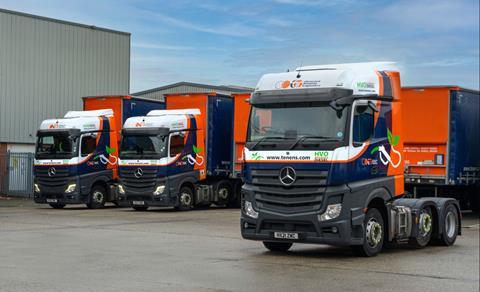
“That is effectively what they’ve done in Europe,” points out Hartles. “The Germans and the Italians have done exactly that. We’ve spent decades working on making the combustion engine more efficient, and we will continue to do that.
“If you have a solution which is a fuel which delivers broadly the same thing in terms of that journey towards net zero, why would you not use that while you are coming up with a technology which delivers absolutely on net zero?”
Huge barrier
Another huge barrier to electrification is the lack of power available at most existing logistics sites.
“Just getting a national distribution centre that’s got the right energy coming into it to be able to charge these vehicles is a challenge,” says Hartles. “I don’t think anyone has really understood the potential ramifications if the government absolutely stuck hard and fast to what they’re suggesting.
“What you’ll probably find is that secondhand vehicles become incredibly valuable because people will just want to run diesel for as long as they can. It will depend on what the alternative is. If the alternative is still a battery electric vehicle which eats into your revenue-generating opportunity, hurts your payload and costs three or four times more than a diesel vehicle, probably you’re going to find that people are going to want to hold on to diesel vehicles.”
Another potential consequence of moving too quickly to battery electric trucks with smaller payloads and limited range is that the supply chain could become much less efficient, as electric trucks based at NDCs in the Midlands may no longer be able to run far enough on a single charge to cover the whole of the UK.
“The amount of cost and inefficiency that injects into the supply chain would be eye-watering,” says Hartles. “I think the general hope is that, if there’s not a solution there, there’ll be flexibility on those dates because otherwise you are unnecessarily injecting significant cost into an already slightly inefficient solution.
“Our infrastructure isn’t great. For a relatively small island, running vehicles in this country has got lots of challenges. Do we really want to inject more unnecessarily if it just means pushing a date out by five or 10 years and being more realistic in what are we trying to achieve from a carbon perspective? Are synthetic fuels a better solution to tide us over until something more long term comes along at a more effective cost?”
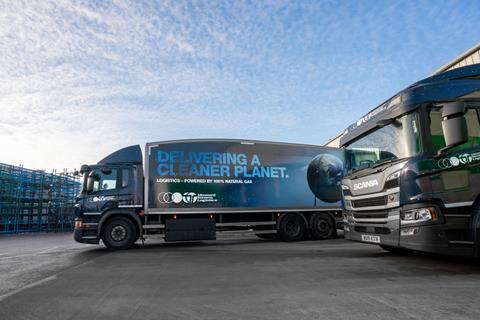
Another loss of efficiency could come from the fact that at present the time required to recharge battery electric trucks could make it harder to double shift them.
“We view the world with 14 shifts available to us, ideally day and night,” says Hartles. “If we are not using a vehicle for 10 of those shifts, then really we should be subcontracting it. We are delivering quite a large amount of freight, but we don’t have a burning desire to put on our own vehicles unless they are generating income at least day and night through Monday to Friday. We work with a lot of partners in the marketplace from a subcontract perspective.”
This subcontractor market is also under threat from the move to net zero, as small to medium size enterprises will find it even harder to raise the funds for zero emissions trucks and infrastructure than the likes of Howard Tenens. And current financial pressures saw a record number of failures in the haulage sector last year.
“It is sad to see some names go that have been in the marketplace for a very long time,” says Hartles. “It is a concern because we have had some good options but it has gone from feast to famine in the subcontract market. The driver market has been very tight because of volume demands and driver availability, but at the moment, we are going through a period where the opposite is true.
“There is a lot of availability and capacity. The market is adjusting accordingly but unfortunately, that does mean that there are people whose businesses are going into administration which is always sad to see. I would hope that as things resize, we see some more stability and we don’t see a complete dearth of family hauliers going forward.”
Are we heading to an over supply of warehousing space?
Anyone driving along the M1, M40 or A5 recently cannot fail to have noticed the glut of large new sheds springing up in response to a shortage of storage space during the Covid-19 pandemic. But new capacity always lags demand so will these shiny new warehouses remain empty?
“It will be interesting to see what happens,” muses Hartles. “From a property perspective, our lettings are performing extremely well, and something like 99% of the estate is let. From a logistics perspective, we have approximately 100,000sq ft across our estate which is empty.
“Roll back 12 or 18 months ago, that was zero, and in fact we were outsourcing volume. My understanding, speaking to various people across the UK, is that there’s quite a lot of grey space, which is space that is let, but empty.
“Therefore, what we’re seeing is some consolidation. As people reach lease ends, they’re either taking a smaller site, or they are consolidating two sites into one. That, plus some of the speculative developments which are coming to the market now, will, we believe, increase supply in the marketplace. Whether that has an effect on rents, I genuinely don’t know.
“You would have thought given marketplace economics, if there’s over-supply and under-demand, you will see rents coming down. However, costs have gone up dramatically. We’ve seen returns on warehousing come down significantly because of rising costs, and so there’s not a lot of scope to reduce rents and still make a return on those assets.
“There could well be developers stuck with warehouses where they need a high rent to make it financially viable, when the market is saying ‘I can get it cheaper elsewhere’. A lot of our estate is slightly older, and that does mean that we can be more flexible with the rent, if required. But where you’ve got a brand new facility, which has cost £150 per sq ft to build, you need to recover that through high rent.
“It’s going to be an interesting marketplace.”
Opportunities
For an ambitious company with a strong balance sheet that marketplace might offer opportunities.
“Certainly, we are hoping as a business that there will be assets on the market for sale at reasonable prices,” says Hartles. “Over the last three or four years, that has not been the case. The cost of buying a building has been astronomical, and we are in the business of buying well, so that hasn’t been an option available to us over the last few years.”
A key factor in any new acquisitions will be the size of the electrical supply.
“Labour is always a massive consideration, as is the geographic centre of gravity,” says Hartles. “I think power is going to be the next big consideration that people really think hard about.
“If you look at some of the sites we’re buying, they tend to be ex-manufacturing sites. Therefore, they’ve got very good power connections. Tactically, that’s one of the reasons why we buy as we do, to make sure that if a tenant wants high energy because they’re running a fleet of electric vehicles or they’re doing some manufacturing on site, we’re able to provide that facility.”
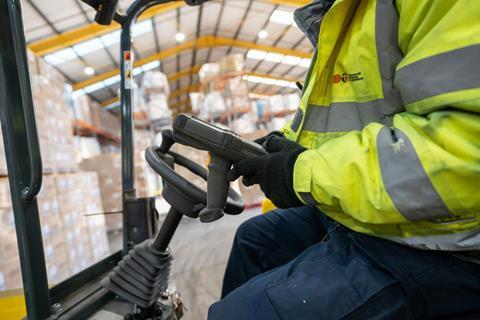
Another source of increased costs has been moves by government to rebalance the burden of business rates away from struggling retail space and onto ecommerce facilities suppling the burgeoning home delivery market. Although little of its warehousing is used for ecommerce, Howard Tenens has been caught up in this trap.
“Business rates on warehousing have gone up enormously,” says Hartles. “Every five or six years, you get a revaluation because asset values have gone up so significantly and every year they go up pretty much in line with inflation as well.
“A lot of our business is B2B. However, in punishing every warehouse by rebalancing rates, you’re punishing people that aren’t even e-commerce. A lot of our clients do have bricks and mortar storefronts, but they need to store their stock to replenish those stores somewhere. In benefiting the retail estate, they’re being punished in the warehouse.
“It’s a bit of a blunt instrument because some of our sites are omni-channel, some are pure-play B2B but very few are pure-play ecommerce. In going after the ecomm providers like Amazon, you’re tarring everyone with the same brush.”
Not a disaster but 2023 peak “very slow”
After months of slow or no growth the UK economy went into recession – defined as two consecutive quarters of falling GDP – in February 2024 and pre-Christmas 2023 volumes were reported to be 10% down year on year in some key sectors.
“We certainly see volumes are not growing in the same trajectory as they were for certain clients,” confirms Hartles. “Some clients, although they’re experiencing the same number of consumer visits, that consumer is spending less per visit.
“I would say people definitely have less discretionary spend. We’re in two pallet networks and we have seen those volumes slow.
“It’s not a complete disaster, but the Christmas peak was very slow last year.”
But the slowdown coupled with rising operating costs is putting pressure on the less efficient 3PLs, which means more opportunities to pick up new work as some inevitably go to the wall.
“We are absolutely going to market from a sales perspective and are looking for new business proactively,” says Hartles. “We expect to land a couple of relatively significant contracts this year, and keeping our warehouses full by replacing lost customer volume is very important to us.
“It’s got to be the right client, but we are going to market and looking for new business, absolutely.”
Although Howard Tenens’ footprint is biased towards the south of the UK and, with an expected £120m annual turnover in 2023, it does not pack the punch of some of its national 3PL rivals, Hartles says the firm has a good track record when it comes to winning new business.
“We have a relatively lean, hard-working leadership team,” he says. “That means that we can be very competitive. Our solutions are smart and well put together, which means they’re efficient. We invest heavily in technology, people and the estate, which means that when we do lock horns with larger competition, if we want to, we tend to win.
“That said, if somebody does want to come in and buy a piece of business at unsustainable rates, we will not follow them down the loss-making position. We’d rather see it go.
“At our scale, at that £120m mark, we’ve got a better strength and depth than we did when we were at £60m. At the moment, the growth trajectory will probably continue, although this year I’d expect some stagnation because we’re seeing a decrease in revenues in some places - but that will be replaced with new business.”
No ownership changes on the horizon
Approaching 80, Peter Morris, chairman and son of the firm’s founder, has no plans to retire or sell the family firm.
Morris bought the company in a management buyout in 1983 and two of his six children, Dan and Ben, are heavily involved in the business, which is owned by a private trust company, specifically designed to maintain long-term family ownership.
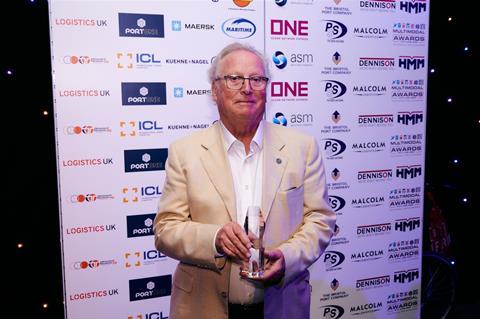
“Peter is very much is involved in the big decision-making on funding and strategy for the business,” says Hartles. “The family employ management to run it, but remain involved and sit on the board.”
“We’re fortunate in that there’s a willing group of shareholders who invest back into the business. There is no exit strategy, and there’s a symbiotic relationship between the property business and the logistics business that works very well.”
Hartles joined the firm in a summer job after finishing his politics and economics degree at the University of Manchester 17 years ago - and never left.
“I started as a commercial administrator, doing a bit of marketing and some other relatively junior jobs,” he says. “Howard Tenens is one of those businesses where there’s always something going on. It’s very much a meritocracy and a business that invests in its people. It has recently funded an MBA for me through Warwick which has been very useful developmental opportunity.
“I’ve been fortunate and I’ve been exposed to lots of different facets of the business, be that operations, IT, finance or commercial sales, and just worked in lots of different capacities until I found myself in this role.
“I’ve also been very fortunate to have a number of very good mentors, lots of good training, lots of working in different depots, and also working with some amazing clients. One of the joys of third-party logistics is you’re exposed to so many different industries and so many clients at a senior level, and you just learn a lot every day.
“For me, it’s lots of luck, lots of good people around me and the backing of a family who believe in the business and believe in the management team.”














